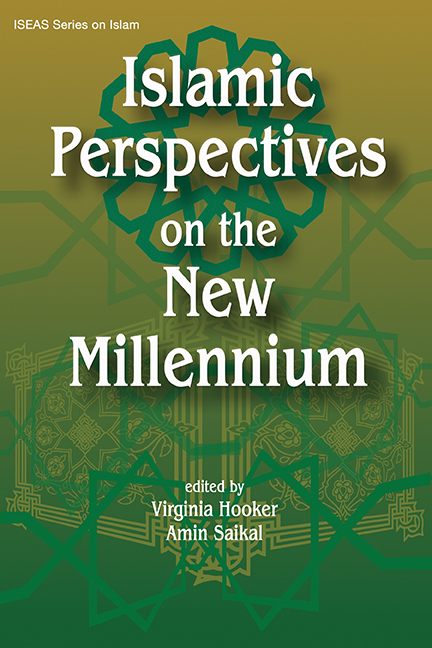Book contents
- Frontmatter
- Contents
- Acknowledgements
- Contributors
- 1 Islamic Perspectives on the New Millennium
- The New World Order
- The New Age
- 4 Islam and Globalization: Arab World Perspectives
- 5 Indonesian Muslims Enter a New Age
- The Economy
- The Nation-State
- Muslim Women
- Law and Knowledge
- Conclusion
- Glossary
- Index of Names
- Index of Subjects
5 - Indonesian Muslims Enter a New Age
from The New Age
Published online by Cambridge University Press: 21 October 2015
- Frontmatter
- Contents
- Acknowledgements
- Contributors
- 1 Islamic Perspectives on the New Millennium
- The New World Order
- The New Age
- 4 Islam and Globalization: Arab World Perspectives
- 5 Indonesian Muslims Enter a New Age
- The Economy
- The Nation-State
- Muslim Women
- Law and Knowledge
- Conclusion
- Glossary
- Index of Names
- Index of Subjects
Summary
The Holy Book teaches that all the faithful are brothers. It is also commanded that ishlāḥ (reconciliation) should always be sought among believers in disagreement as an aspect of devotion to Allah. These teachings about brotherhood are followed by an injunction about the first and foremost principle for the preservation of the brotherhood of Muslims (Ukhuwwah Islāmiyyah), namely, that among the faithful no one group should put down others. This primary principle is followed by several other injunctions explaining things which can destroy brotherhood, like insulting one another, referring to other believers by unpleasant names, being prejudiced, looking for faults in others, and bad-mouthing people (committing ghībah, that is, discussing the flaws of someone not present). This series of divine commandments about brotherhood is followed by an affirmation of the principle that all mankind are brothers, and that the division of mankind into different races and ethnic groups was meant to provide markers of self-identification (identity), which must be borne in a broader humanitarian environment with an attitude of absolute mutual respect. It is also stressed that a person's dignity and worth cannot be measured by external factors such as nationality or language, for dignity and worth consist in a truer philosophy of life, subsisting in man's deepest self, namely piety — and only Allah knows and can measure piety (Q. 49:10–13). Thus God alone has the right to measure and determine Someone's worth, whereas a man must appraise other men in the spirit of equality.
If we consider aspects of Islam which could be the focus for reinterpretation, the noble spirit of humanitarianism (ḥabl min al-nās) should receive greater attention. It constitutes the second aspect of Islamic teachings after the spirit of godliness (ḥabl min-Allāh). This is, in fact, widely known among Muslims. So what is needed are substantiations, indicating the foundations in sacred sources (the Holy Book and Sunna) and reinvestigating a range of historical evidence, because no matter how exalted a teaching, what really influences society is its concrete realization in history, that is, in man's social and cultural life in the context of a particular place and time. So the approach to teachings as far as possible is not dogmatic, but analytical, even in the approach to understanding sacred sources.
- Type
- Chapter
- Information
- Islamic Perspectives on the New Millennium , pp. 74 - 88Publisher: ISEAS–Yusof Ishak InstitutePrint publication year: 2004

